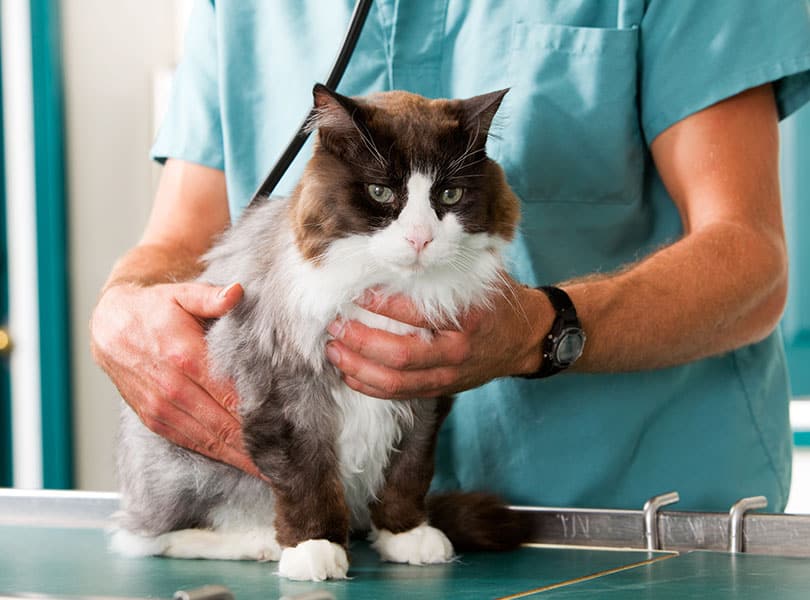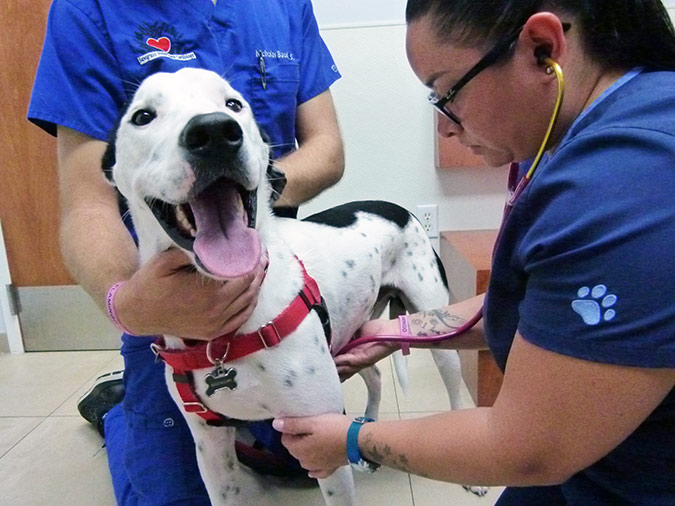What You Need to Know About Vet Solutions: An Overview of Diagnostic Devices and Procedures
Vet solutions play a vital duty in maintaining the health of family pets. Regular examinations can expose covert health problems early. Numerous analysis devices and procedures, such as blood tests and imaging techniques, give necessary understandings right into a pet's wellness. Comprehending these techniques is vital for animal owners. What specific diagnostic treatments are most generally used, and just how can they affect a family pet's therapy strategy?
Importance of Routine Veterinary Check-Ups
While numerous family pet owners might take too lightly the value of routine vet examinations, these consultations are essential for keeping an animal's general health and wellness. Regular brows through to the vet enable very early detection of possible wellness issues before they escalate into serious troubles. Regular check-ups often include vaccinations, which are very important for preventing transmittable conditions that might badly affect a family pet's well-being. In addition, these consultations supply a possibility for veterinarians to analyze the animal's weight, oral health and wellness, and total problem, ensuring that the pet is thriving. Throughout these sees, pet dog owners can additionally get beneficial suggestions on diet, exercise, and precautionary care customized to their certain family pet's demands.
Usual Diagnostic Procedures in Vet Medicine
In vet medicine, precise medical diagnosis is necessary for effective treatment. Common analysis treatments consist of blood screening methods, progressed imaging innovations, and urinalysis, each playing a considerable duty in determining health and wellness concerns. Comprehending these approaches enhances the capacity to supply ideal look after pet people.
Blood Testing Methods
Blood testing methods act as essential diagnostic tools in veterinary medicine, making it possible for veterinarians to evaluate the health of animals accurately. These methods entail collecting blood samples to analyze different components, such as white and red blood cells, platelets, and biochemical markers. Typical tests consist of total blood matters (CBC), which review total health and identify infections, and biochemical panels, which evaluate body organ function and metabolic condition. Furthermore, serological examinations can recognize particular conditions through antibody detection. Blood screening is minimally intrusive and gives essential information that aids in diagnosing problems, monitoring health condition, and examining feedbacks to treatments. In general, these strategies play an important role in guaranteeing excellent care for family pets and livestock alike.
Imaging Technologies Utilized
Analysis imaging technologies are vital tools in vet medicine, enhancing blood testing strategies by providing visual insights right into an animal's interior structures. Typical imaging modalities consist of X-rays, which are beneficial for assessing bone fractures and identifying international items, and ultrasound, which enables for real-time visualization of soft tissues and organs. Magnetic resonance imaging (MRI) provides thorough photos of complicated anatomical areas, especially in neurological assessments. Calculated tomography (CT) supplies cross-sectional photos, improving diagnostic precision for different conditions. Each of these technologies aids veterinarians in diagnosing health problems, planning therapies, and monitoring recovery. By including imaging modern technologies, vet experts can better evaluate an animal's health and make educated decisions regarding their treatment.
Urinalysis and Diagnostics
Urinalysis works as an important diagnostic device in veterinary medication, providing useful insights right into a pet's total wellness and helping in the detection of different problems. This non-invasive treatment assesses urine samples to evaluate kidney feature, hydration condition, and metabolic problems. Common elements taken a look at include details gravity, pH degrees, glucose, proteins, and the presence of blood or bacteria. Unusual searchings for can show problems such as urinary tract infections, diabetes mellitus, or kidney disease. To boost analysis precision, urinalysis is usually performed along with various other tests, such as blood work and imaging research studies. Early detection via urinalysis can bring about prompt treatments, enhancing the prognosis for lots of veterinary clients. Therefore, it is a necessary aspect of complete veterinary care.
Understanding Blood Tests and Lab Evaluation
Understanding blood tests and laboratory analysis is essential in veterinary medicine as it aids in diagnosing various health problems in animals. Various kinds of blood examinations give crucial information concerning a pet's interior state, while analyzing lab results calls for careful consideration of countless variables. This area will certainly explore the kinds of blood examinations readily available and the significance of their outcomes.
Sorts Of Blood Tests
Blood tests play a vital role in vet medicine, giving necessary insights right into a pet's health and wellness status. Different kinds of blood examinations are utilized, each offering different objectives. Total blood counts (CBC) evaluate general health and wellness and identify problems such as anemia or infection. Biochemical profiles assess organ function by determining enzymes and electrolytes, using insights into metabolic health and wellness. Serological tests identify details antibodies or microorganisms, assisting in the diagnosis of infections or autoimmune illness. Blood typing assurances safe transfusions, while coagulation tests determine the blood's capacity to embolisms, vital for surgeries. These examinations jointly enhance medical diagnosis, treatment planning, and surveillance of an animal's health and wellness, illustrating the value of extensive lab analysis in vet treatment.

Analyzing Laboratory Outcomes
A thorough analysis of lab outcomes is necessary for accurate diagnosis and treatment in veterinary medication. Translating lab results needs an understanding of normal referral varieties and the value of deviations. Blood examinations can reveal different wellness indications, such as body organ feature, electrolyte equilibrium, and the visibility of infections. Veterinarians must think about the entire medical picture, consisting of the animal's background, physical examination searchings for, and any kind of signs and symptoms presented. Variants in outcomes might develop from elements such as age, breed, and underlying health conditions. Laboratory outcomes ought to not be watched in isolation however instead as part of a comprehensive diagnostic strategy. Exact interpretation permits tailored treatment strategies and much better results for veterinary patients.
Imaging Techniques: X-rays, Ultrasounds, and Beyond
Imaging strategies are vital tools in vet medicine, offering critical insights into the wellness and health of animals. Among the most frequently utilized techniques are Ultrasounds and x-rays. X-rays are important for visualizing bone structures, helping vets recognize cracks, growths, or foreign things. This technique is non-invasive right here and quick, making it ideal for urgent situations.Ultrasounds, on the other hand, utilize sound waves to produce photos of soft tissues and body organs. This strategy is particularly beneficial for analyzing the heart, abdomen, and reproductive organs, enabling vets to assess conditions like liquid build-up or organ abnormalities.Beyond X-rays and ultrasounds, progressed imaging strategies such as computed tomography (CT) and magnetic vibration imaging (MRI) are progressively used in vet method. These approaches provide in-depth cross-sectional photos, improving the precision of medical diagnoses and therapy strategies. CT Scans For Animals. Overall, imaging techniques play a crucial role in guaranteeing reliable veterinary treatment
The Function of Biopsies in Diagnosing Animal Wellness Issues
Accuracy in diagnosing wellness problems in family pets commonly depends upon the usage of biopsies, which offer conclusive details concerning cells problems. A biopsy entails the elimination of a little sample of tissue for examination under a microscopic lense, enabling vets to identify various conditions, including infections, growths, and inflammatory diseases. This diagnostic tool is vital for comparing malignant and benign growths, guiding treatment decisions, and reviewing the seriousness of a condition.Biopsies can be done utilizing different strategies, such as needle ambition, incisional biopsies, or excisional biopsies, depending upon the location and kind of cells involved. The choice of approach might impact recuperation time and the quantity of cells collected. Ultimately, the details gleaned from a biopsy can lead to targeted therapies, boosting results for animals facing severe wellness obstacles. Veterinarians stress the significance of this treatment in accomplishing exact medical diagnoses and efficient treatment strategies.
Advanced Diagnostic Tools: Endoscopy and CT Checks

Advanced analysis devices, such as endoscopy and CT scans, play an important role in modern veterinary medicine, providing non-invasive methods to picture inner frameworks and diagnose numerous problems in family pets. Endoscopy involves making use of an adaptable tube outfitted with a video camera, permitting vets to examine the stomach system and breathing system directly. This strategy can expose irregularities such as tumors, foreign bodies, or swelling, allowing targeted therapy plans.CT scans, on the other hand, use sophisticated imaging innovation to develop in-depth cross-sectional pictures of the body (Ultrasound For Dogs). This method is especially beneficial for examining facility frameworks like the mind, spine, and joints. By offering high-resolution pictures, CT scans aid vets in recognizing concerns that might not appear through conventional radiography. Together, these innovative devices boost diagnostic accuracy, improve therapy end results, and eventually add to much better general family pet health monitoring

Translating Examination Outcomes: What Animal Owners Should Know
Understanding examination results can be a tough task for pet dog owners, especially after advanced procedures like endoscopy and CT scans have actually been done. Translating these results calls for an understanding of clinical terms and a clear understanding of what the searchings for suggest concerning the family pet's health. Vets usually offer explanations, however the intricacy of the outcomes can still bring about confusion.Pet proprietors must actively participate in discussions with their vets, asking questions to clarify any uncertainties. It is important to comprehend irregular versus typical results and the ramifications for the pet's treatment plan. Furthermore, acknowledging that some outcomes may require more testing or monitoring can aid proprietors stay notified about their animal's wellness trip. Ultimately, a collective technique between family pet proprietors and veterinary specialists promotes better health end results and improves the overall treatment experience for pet dogs.
Regularly Asked Concerns
How Do I Select the Right Vet Facility for My Pet?
Choosing the best vet facility entails investigating local options, evaluating certifications, checking out facilities, and analyzing personnel communications (Board Certified Veterinary Cardiologist). Focusing on referrals from relied on sources can assist guarantee the finest care and setting for an animal's health needs
What Should I Do if My Animal Refuses to visit the Vet?
When a pet rejects to visit the vet, it's recommended to remain tranquil, usage treats or toys to lure them, and consider scheduling a home see if anxiety continues. Perseverance and favorable support are vital.
Are There Telehealth Options for Vet Solutions?
Telehealth alternatives for veterinary solutions are progressively offered, enabling pet owners to talk to vets from another location. These solutions enable discussions regarding wellness issues, suggestions on minor conditions, and follow-ups without requiring to go to a center.
Just how Frequently Should My Family Pet Have Dental Check-Ups?
The frequency of oral exams for pets typically depends upon their age and type. Usually, vets advise yearly oral analyses, although some pets may need even more frequent check outs to preserve excellent oral health and wellness.

What Are the Prices Connected With Vet Diagnostics?
The prices connected with veterinary diagnostics can vary widely, usually ranging from basic examinations like Recommended Reading blood job to sophisticated imaging strategies. Elements influencing expenditures include the center's location, tools made use of, and particular examinations needed for each and every pet dog. Vet solutions play an essential function in keeping the health of pets. While numerous animal proprietors might take too lightly the importance of routine veterinary check-ups, these consultations are vital for preserving a pet's overall why not try here wellness. Furthermore, these visits give a possibility for veterinarians to analyze the animal's weight, oral health, and total problem, guaranteeing that the animal is flourishing. Precision in detecting wellness problems in pets usually pivots on the usage of biopsies, which give clear-cut details regarding cells abnormalities. Additionally, identifying that some outcomes may call for additional testing or surveillance can aid proprietors remain informed regarding their pet dog's health and wellness trip.
Comments on “How Accurate Are CT Scans For Dogs in Detecting Health Issues?}”